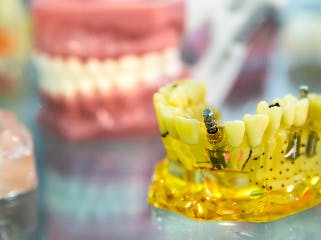
Periodontal Disease: an enemy not so silent
by Wildsmile
The teeth are held in place thanks to the support given by the gums. However, poor brushing habits can lead to gum tissue infection, making them no longer an effective support. This is where we come across periodontal diseases that can be treated here.
Causes of periodontal disease
Periodontitis, another form in which periodontal disease is known, not only damages the soft tissue that forms the gums, but also erodes the bone on which the teeth rest. The causes of periodontal disease are punctual and accurate and, in most cases, preventable and reversible:
- - Insufficient dental hygiene
- - Not checking with the dentist
- - Genetics
- - Types of bacteria in your mouth
- - Diabetes
- - Osteoporosis
- - Smoking
Sometimes, due to lack of time or circumstantial forgetfulness, we forget to brush our teeth after every meal. If we add to this the fact that we do not FLOSS twice a day we face the main cause of periodontal disease.
Poor DENTAL HYGIENE causes plaque, a layer made up of oral bacteria, to adhere to the tooth faces and the spaces between the gums and teeth, causing infection and eventual separation of the tooth from the supporting gum.
Symptoms of periodontal disease
Although there are causes of periodontal disease that cannot be prevented, periodic reviews (at least twice a year) with the dentist serve to detect the problem and thus put a solution before the disease reaches the ground.
Although we all have bacteria in our mouths, we do not share the same kind of microorganisms. This explains why some people generate tartar in six months, while others do not generate tartar in two years, considering they have the same oral hygiene habits.
We should be alert to gum disease when we experience one or more of the following symptoms:
- - Gum pain
- - BLEEDING GUMS
- - Chewing pain or discomfort
- - Swollen Gums
- - Gingival sensitivity to touch
- - BAD BREATH
- - Gingival retraction
- - Suppuration in the area of union between teeth and gums
- - Loose teeth
Types of periodontal disease
Chronic Periodontitis
It is the most common of all periodontitis. It usually advances, although there are also stages in which improvements are experienced. It causes the gums to retract and the bone that supports the teeth is reduced until it is no longer able to support the teeth.
Progressive Periodontitis
Usually begins in early youth or even in childhood. It must be treated, otherwise the bone is destroyed and no longer fulfills its function.
Necrotizing Periodontitis
The main feature is that it presents the death of gum tissue. As this happens as a result of the lack of blood supply to the gums, the ligaments that attach the teeth to the bone and the bone itself also die. Typically, this variant of the disease occurs only in people who have a depressed immune system, which occurs when they have a poor diet, are on chemotherapy, or have HIV.
Consequences of periodontal disease
- - Tooth loss
- - Heart disease
- - Pulmonary Conditions
- - Rheumatoid arthritis
You may accept that the first consequence is expected, as it is a condition in the tissues that support the teeth, so it is not surprising that dental parts can be lost. However, you are expected to wonder how a gum disease might end up affecting the heart. The explanation is simple: This gum disease is caused by bacteria that enter the bloodstream and cause coronary artery disease, respiratory infections, and other serious diseases.
Treatment of periodontal disease
Before beginning treatment for periodontitis, an x-ray is required to assess the depth to which the tartar has reached. After the images are taken, the dentist analyzes the type of bacteria that is lodged in the gums. The latter is called a microbiological study. This study will allow us to prescribe the appropriate antibiotic for each case..
In order to remove tartar, the roots are scraped and straightened. Since it is necessary to introduce an instrument called a curette between the gums and teeth, which involves contact with the root nerves, the procedure must be performed under the effects of local anesthesia. If country regulations permit, another option is to use laughter gas (nitrous oxide)..
Once this procedure is over, your dentist will make an appointment to re-evaluate your gums and, when everything returns to normal, follow up periodically.
Want to learn more about this?
Contact us
Your contact request is registered. We will contact you as soon as possible.
Lorem ipsum dolor sit amet, consectetur adipisicing elit. Adipisci alias aliquid amet commodi dolor, dolore doloremque dolores fugit quod repellat.
 POR
POR
 ENG
ENG





